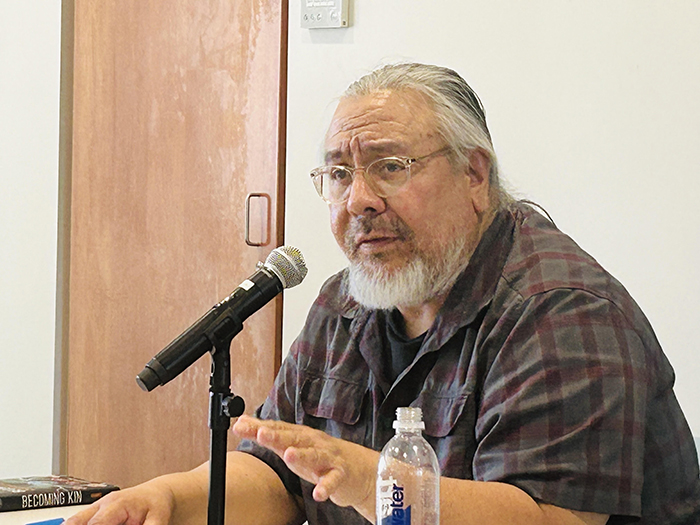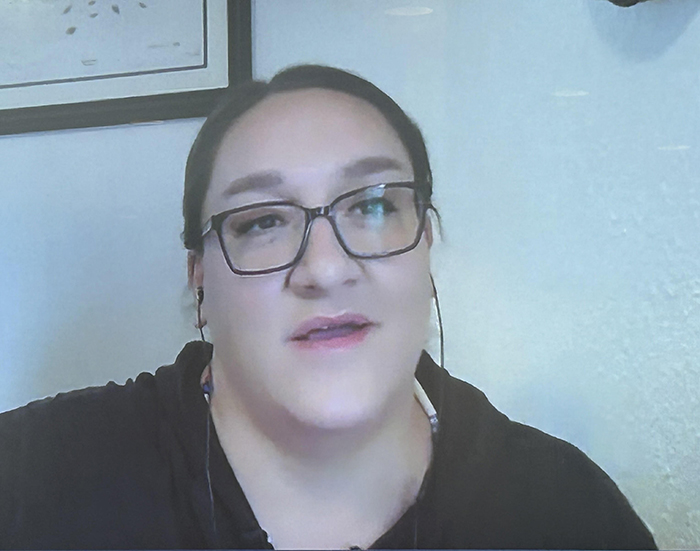Understanding Native American history
News | Published on April 23, 2024 at 11:59am EDT | Author: henningmaster
0Indigenous people speak about history in United States


Darren Renville (left) and Prairie Rose Seminole (right) spoke with area residents at a special presentation at the Fergus Falls Public Library regarding Indigenous history in the United States.
By Tom Hintgen
Otter Tail County Correspondent
On April 13 Otter Tail County residents gathered at the Fergus Falls Public Library and joined Indigenous leaders Prairie Rose Seminole and Darren Renville in exploring the Doctrine of Discovery, regarding Indian lands. The doctrine stated that land held by non-Christians was available for settlement.
President Andrew Jackson signed into law the Indian Removal Act of 1830 which contributed to the loss of entire Native American tribes east of the Mississippi River. Also lost were Native American culture, traditions and languages.
The 67 people attending the program at the public library gained insight into a small part of the Indigenous history in our country.
Today there are 577 tribal nations scattered throughout the United States. These nations are served by the U.S. Department of the Interior which oversees the Bureau of Indian Affairs (BIA). The bureau assists 1.9 million Native Americans with housing, education and economic development.
Many attendees saw this as an opportunity to learn more about the complex and troubled interaction of the dominate white culture with native peoples.
Seminole is a member of three Affiliated Tribes in western North Dakota, a descendent of the Lakota Nation. She is an educator and advocate for Native Americans while working to, in her words, “establish restorative practices for building communities.”
Renville is a member of the Sisseton, Wahpeton Tribal Nation and works as a writer, educator and lecturer. Today he teaches at Minnesota State University, Mankato, helping students “begin to comprehend the vast history of native cultures and the scope of today’s contemporary issues facing Indigenous Americans.”
Attendees, prior to the April 13 seminar, were encouraged to read the book “Becoming Kin” by Patty Krawec in order to gain a better understanding of Native American history.
“My sociology students read and thoroughly discussed Krawec’s book and I was pleased to see many of them attending this community event,” said Dr. Sue Wika, Sociology Instructor at M State Fergus Falls.
“Hearing from Darren Renville and Prairie Rose Seminole was the perfect accent to our study of the historic and contemporary implications of the Doctrine of Discovery. The students recognize that having relationship with other people and the land is key to creating a more just and livable future.”
M State student Andee Bach, a member of Wika’s sociology class, said she learned much during the 2-1/2-hour seminar. “A close friend of mine grew up on the White Earth Indian Reservation north of Detroit Lakes,” she added.
Seminar sponsors were the Fergus Falls Public Library, Otter Tail County Historical Society and the Unitarian Church of Underwood.
Attendees learned that Indigenous children in the United States and Canada, in previous decades, were forcibly removed from their families and placed into boarding schools. Two of the schools were located in Morris and Wahpeton.
The Indian schools were established to eradicate Native American language and culture.
Some adults who attended Fergus Falls Junior High School in the early 1960s remember football games with the Wahpeton Indian School. The school later became known as the Circle of Nations School, with a mission to build academic achievement and foster healthy development of the whole child in an inter-tribal environment.
The seminar speakers, Seminole and Renville, said that Native Americans after years of repression need to work to engage in a new system of relationships. “We all live in a single world and must learn how to live in the same places,” Renville added.
A big step in that direction took place in 2021 when Deb Haaland made history by becoming the first Native American to serve as a cabinet secretary. She heads the U.S. Department of the Interior which, as mentioned, oversees the Bureau of Indian Affairs (BIA).

